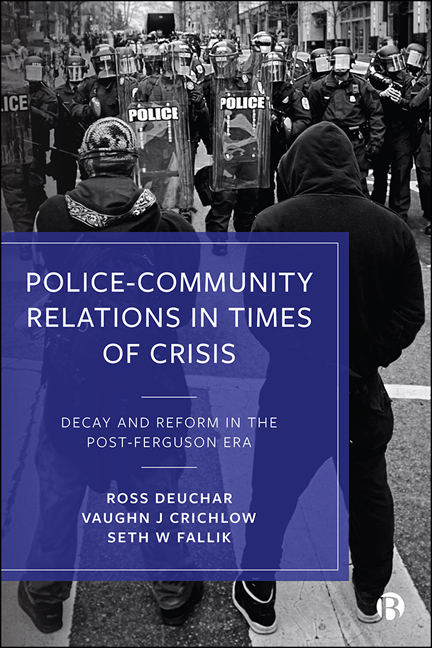Epilogue
Published online by Cambridge University Press: 21 December 2021
Summary
As we reflect on policing in times of crisis, we acknowledge the frequent reminders of the need for difficult conversations about racial injustice. It may be a comforting notion that most officers do not intend to treat Black residents differently from their White counterparts, or to use force unjustly in neighborhoods that lack political efficacy, yet this does not diminish the pain that many feel in the aftermath of tragic encounters with police. Given the unabated grievances that stem from the shortcomings of the justice system, it is clear that racial conflicts in America's past cannot be treated as mere historical artifacts. It is lamentable that such conflicts seem to define life in America today as law enforcement continues to face scrutiny due to the conduct of officers in Black and Brown communities. This book draws attention to the undeniable fact that within geographical pockets of disorder and neglect in urban landscapes, police–community relations are shaped by a problematic racial history and a pervasive cognitive landscape of anger, resentment, and disillusionment (Brunson, 2007; Rothenberg, 2013; Cobbina, 2019). Moreover, the unshakeable reality of police violence on the streets reminds us of the likelihood that we will experience more “Fergusons” in the near future.
Throughout the previous chapters we have suggested that noble efforts by law enforcement to “mend the fences” are often undermined by recurring incidents of perceived excessive force by police officers. The movement against racial injustice has clearly resonated with millions of people around the world and drawn an unprecedented worldwide response, and during the time of writing, this fact has become abundantly clear. On May 25, 2020, a White Minneapolis Police Department officer killed George Floyd, a 46-year-old Black man, by kneeling on Floyd's neck for seven minutes and 46 seconds, while he was handcuffed and pleading for his life with cries of “I can't breathe” (Kiang & Tsai, 2020; Nwonka, 2020). Floyd's plea seemed to echo the words uttered by Eric Garner back in 2014, whose life also ebbed away slowly and painfully while he was being restrained with a chokehold on the ground by police.
- Type
- Chapter
- Information
- Police-Community Relations in Times of CrisisDecay and Reform in the Post-Ferguson Era, pp. 169 - 174Publisher: Bristol University PressPrint publication year: 2021



